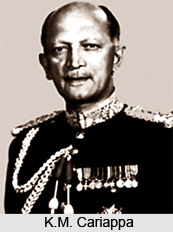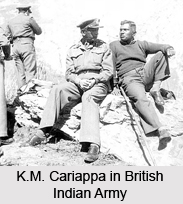 Kodandera Madappa Cariappa was over-the-top zealous in his affair to get himself selected in British Army as a Commissioned officer. His efforts had paid off soon after he was into college. Cariappa`s selection would create a historic step on behalf of British generals, because, till then, no Indian had been given the King`s Commission. Only soldiers were recruited in the Army and later the Viceroy`s Commissioned ranks were available for Indians. A person holding a rank by King`s Commission in the British Armed Forces was an officer (Class I). On the other hand, the Viceroy`s Commission was specially created for India. It was considered lower to the King`s Commission.
Kodandera Madappa Cariappa was over-the-top zealous in his affair to get himself selected in British Army as a Commissioned officer. His efforts had paid off soon after he was into college. Cariappa`s selection would create a historic step on behalf of British generals, because, till then, no Indian had been given the King`s Commission. Only soldiers were recruited in the Army and later the Viceroy`s Commissioned ranks were available for Indians. A person holding a rank by King`s Commission in the British Armed Forces was an officer (Class I). On the other hand, the Viceroy`s Commission was specially created for India. It was considered lower to the King`s Commission.
K.M. Cariappa was commissioned to the rank of 2nd Lieutenant after his successful training as a cadet officer in British Indian Army. This was the first batch of Indian officers who, after passing out from Indore, were listed in the Gazette of India Notification, 1920. Cariappa was posted to the 2/88 Carnatic Infantry. But soon he was thrown in the midst of action against the rebels of Iraq who had taken up arms to gain independence from the British. His new posting to 2/125 Napiers Rifles saw him in Mesopotamia (Iraq). Based in the valley of the rivers Tigris and Euphrates, Cariappa was assigned the task of security and protection of oil installations and ports in the area. Since this strategic area was in the region of Persian Gulf, the Russians too had an eye on it. For the Britishers, it amounted to threat to their interests and therefore, extra precaution had been taken.
On Cariappa`s return to India, he was once again transferred to another unit known as the 7th Prince of Wales Own Dogra Regiment. This unit was moved to Waziristan (bordering Afghanistan) in the North West Frontier Province (NWFP) which was another hot-spot of hostilities with the tribes of the region.
Waziristan is a bleak mountainous region of approximately 12,950 square km, and is now in Pakistan. It borders similar desolate mountain ranges of Afghanistan. The desert-like extreme climate and meagre resources makes living conditions very harsh for the sparse Pathan or Pashtoon population and other tribes. The terrain makes it easy for them to indulge in surprise raids and escape with the loot to their inaccessible hideouts in the mountains. In short, these tribes had perfectly mastered the art of guerrilla warfare in small groups. None could succeed in their territory till Maharaja Ranjit Singh sent his general Hari Singh to subdue them. The peace with Sikhs, however, did not last long. It was disturbed soon after the death of the Maharaja and these tribes returned to their old ways of surviving through shooting and looting. Their victims were mostly unwary travellers and military convoys.
Initially, Cariappa had a hard time controlling these insurgents. They sporadically attacked the military units and outposts probably capturing some arms and ammunition too. The terrain was helpful to these sly raiders and encounters with them gave Cariappa an opportunity to prove his superior mettle and courage.
Here did K.M. Cariappa unleash his prowess to battle, when honestly serving under British Indian Army. Once a convoy moving under his command was ambushed by the rebels who inflicted some casualties and damaged a number of vehicles. He engaged the enemy on the slopes of a hill. Though Cariappa`s team could not match their more effective gunfire from the heights, he re-grouped his men and chased the attackers back to their hideouts. Meanwhile, quick reinforcements arrived under two British officers. Later, at Cariappa`s headquarters, this bold engagement had become a topic of serious discussion when he made a strong case for truthful reporting. The superior British officers respected Cariappa`s views and accordingly, his ideas and innovations to counter the guerrilla insurgency were put on the anvil together with the conventional strategy of warfare.
Soon Cariappa found himself elevated to prestigious Staff appointments under British Indian Army. He became Adjutant to his British Commanding Officer and undertook the responsibility for discipline and conduct of operational tasks. Later on, he was appointed as the Quarter Master and in this capacity, he looked after all the needs of the Battalion in respect of vehicles, equipment, clothing and barracks. This appointment carried equal, if not more prestige, as the incumbent had to be responsible for the logistic support during an operation. This support operation had to be backed up with transport, recovery of damaged vehicles and other requirements of the unit on the move. All these duties took K.M. Cariappa many steps towards shouldering higher responsibilities later.

His close relationship with the British officers and his good judgement, not only gave him the advantage of understanding them better, but also helped Cariappa in gaining superiority over others. In fact, one could never miss the strong streak of British mannerism in Cariappa, but this did not mean that he was not proud of being an Indian. Cariappa`s selection in British Indian Army had in fact elevated the armed forces section, in the process making `natives` proud during those turbulent times. Far from that, it only pointed to his `severe uprightness and integrity` which he would not compromise at any cost.
It will also be curious to know that Cariappa emulated only the exceptionally good British officers and avoided those who did not measure up to his expectations. But at the same time, he was wise enough not to make any adverse comments on them.
Cariappa`s real character was revealed in the battlefield, while serving in the British Indian Army. Many a time, he was seen standing directly in the line of fire and making fun of the enemy`s poor aim. It was a very dangerous act but he was doing all this to encourage his jawans. Ensuring their safety was always uppermost in his mind. A display of such boldness is considered a quality which any military leader must possess to lead his men and turn a defeat into victory. Disregarding any risk to his own life, Cariappa weighed the stakes, but gave more importance to the trust which his men had reposed in him. For Cariappa, the welfare of the jawans was of utmost importance and even after his retirement, he took a keen interest in improving their living conditions.
When things were a bit easier for him, Cariappa was allowed to go on foreign tours to broaden his outlook. The General Headquarters (as the Army Headquarters was called those days) made arrangements for his stay and contacts with the British units stationed abroad and he visited Japan and China. Cariappa was very impressed by the progress made by the United States of America.
On return to his Regimental Centre at Fatehgarh, Cariappa took pains to prepare himself professionally to take on higher responsibilities. At the same time, he was happy to impart his knowledge to others who needed it. This helped Cariappa widen his circle of British friends. Even the wives of his superior British officers prayed that he should reach higher. These few qualities highly elevate a man like Cariappa, who by sheer will force and determination had come this long, to mingle in British high circle. Cariappa`s career in British Indian Army was bound to rise at any cost.
However, Cariappa`s ambition was to enter the British Staff College in Quetta, which is the largest city in Baluchistan province in Pakistan. It is strategically located on the road to Kandahar in Afghanistan via Chaman which is the last border-town and is famous for its fine grapes.
Quetta assumed greater importance with the establishment of an elite Staff College of the British Indian Army here in 1905. Admission to this college was open exclusively to the British Regimental Officers through stiff competition. Once, a person entered this college, there was no dearth in getting appointments and promotions. Obviously, it was Cariappa`s cherished dream to get into the College. For nearly 28 years, right from the time of its inception, no Indian had crossed the threshold of this institute, firstly because no Indian was granted King`s Commission till 1920 and secondly, the four vacancies kept for Indians were never filled.
K.M. Cariappa became the first Indian officer under British Indian Army. He even confronted demoralising opposition from some jealous British officers. By remaining cool and composed, he faced the uphill task with fortitude. In this respect, credit must go to his Commanding Officer who gave him unceasing encouragement. Besides, he received the assistance of one of his close British friends. With this help, he was able to go to England to sharpen his professional skills at the Royal United Services Institute; the Coldstream Guards in London and the Royal Artillery School at Larkhill. Here too, Cariappa was the First Indian Officer to get direct attachment to these British units in England.
It is needless to point out that Cariappa derived tremendous benefit from this brushing up. At the end of his stay there, he presented a silver souvenir to the Coldstream Guards when they bid him adieu. Cariappa`s hard work finally met with success when in 1933, he got through the competitive examination with flying colours and joined other British officers for the next course at the Staff College.
The course included among other subjects, a detailed study of new orientation and development of techniques for future warfare in the light of the experience gained from World War I. Here also, Cariappa excelled in his studies. Cariappa while serving under British Indian Army in fact had risen to such heights, which perhaps is still unreachable in Indian Army. Whatever he touched had turned to gold. There must have been reason enough for British officers to envy an Indian escalating to such top positions. Although Cariappa`s unassuming nature never did emote any such feeling of pride, while doing his job as a British Army officer.




















